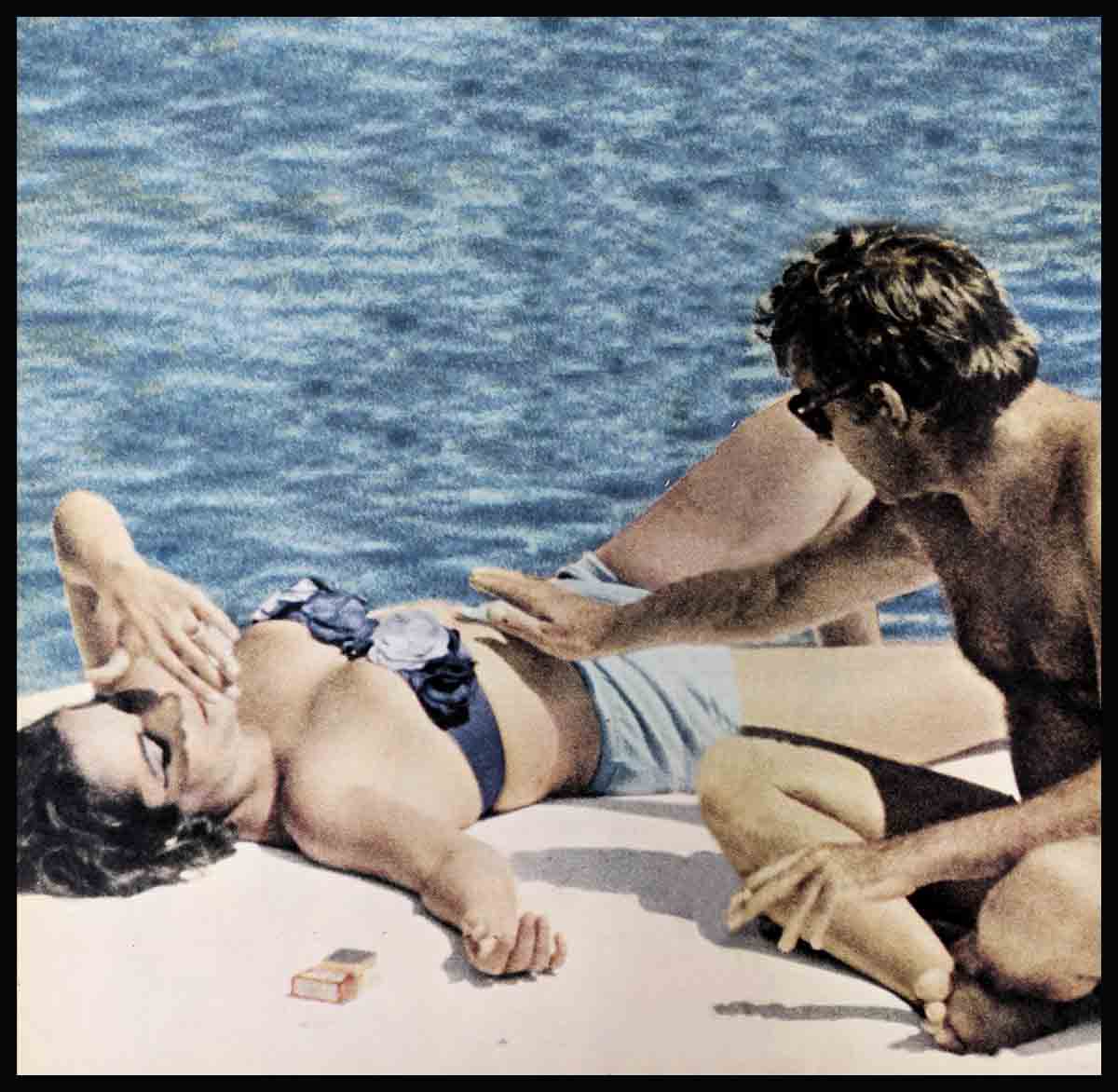
It Begins With “M” . . . The 4-Letter Word That Rules Elizabeth Taylor’ Life
Elizabeth Taylor is thirty-one now, and for over fifteen years the girl who could wheedle anything with those huge purple eyes has seemingly lived a life of desperate, desire-ridden progression from want to want, not from enjoyment to enjoyment. “A million dollars to her,” a friend of Liz’ had to admit ruefully, “is like a pastrami sandwich to anyone else.”
Hers seems forever a kind of feverish, eager yielding to one of the deadliest of all the seven deadly sins: greed. A ravenous, devouring greed to have her cake and eat it, too. Never mind how. What Liz wants can be summed up in one simple, very common four-letter word: MORE. . . . Is this too harsh, too cruel a judgment on the girl who once burbled to her mother, impressed and thrilled after a visit to a fortuneteller, “Mother, she told me my mission on earth was to bring happiness to people!”
To others—or was it to herself? After all, it was the incredibly beautiful Elizabeth who pouted, after fourth husband Eddie Fisher had begun to bore her to distraction and those purple eyes were measuring Sybil Burton’s husband, “I can choose any man I like. I don’t see why everyone is making such a fuss.”
Liz is the girl who always had to hurry after love; the girl who, at fifteen or twenty-five or thirty, apparently clung to one self-enchanting way of life: that there was no use being beautiful if it was only for one man. No point at all.
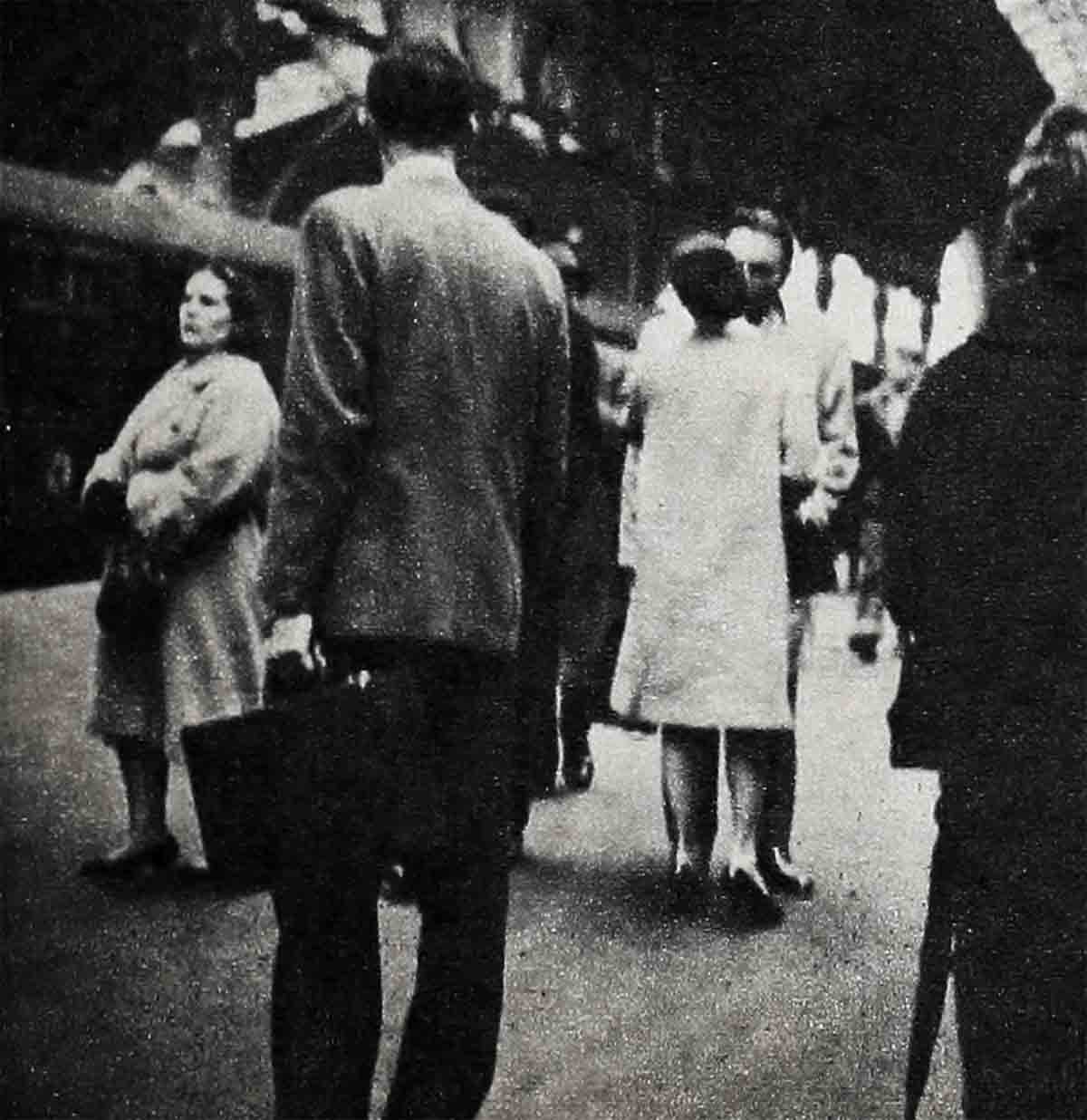
Has Liz been aware of this—or even confessedly cognizant of that four-letter word that so ruthlessly rules her life? “There seems no outward sign of it,” said a Los Angeles psychiatrist noted for his unerring dissection of the minds and emotions of Hollywood stars. On his desk lay a thick dossier of the life and times of Elizabeth Taylor, assembled for him by this reporter. “This,” Doctor X went on, tapping a recent picture of Elizabeth, “shows a woman whose deliberately veiled eyes defy anyone to penetrate that special universe she has staked out as her own.” It was a universe that began to be molded by her—or for her—when Elizabeth was yet a child. She was, as magazine writers have detailed the weary story, always and forever, Elizabeth the Queen. At the ripe age of two, tiny Elizabeth was already a seasoned and sophisticated traveler who dined at New Orleans’ famed Antoine’s in a high chair, eating Oysters Rockefeller and pompano in a paper bag. In her very early teens, when she was already the cherished treasure of mighty M-G-M, it seemed to the schoolgirlish Elizabeth that the curves of Esther Williams and Lana Turner and other lovely older ladies were attractions that she, too, had to possess. So she liberated a special stretching device used by her brother Howard (he had ambitions to become a gymnast) and zealously applied herself. Several years and 10,000 stretches later, Liz emerged from the Taylors’ basement gym with one of the most awe-inspiring collections of curves in town. Perhaps nature would have developed them anyhow, but Elizabeth was in a hurry to have “more, more, MORE,” and she just couldn’t wait. And only a day or so after her first real date, at fifteen, with young M-G-M actor Marshall Thompson son (“Mother, he kissed me; he kissed me!”), Liz was already dreaming of an expanded and richer life. Shyly, she asked Marshall “if he would not like to go steady.” The “going steady” lasted a little more than two weeks. . . . “In the simplest possible layman’s terms,” Dr. X remarked, “I’d say that the pattern of Miss Taylor’s future life here begins to emerge. Apparently—or so it seems from what you’ve said and from what I’ve uncovered in this dossier here—Elizabeth was unbelievably shattered by the traumatic discovery that her girl friends dated, but that she, the favored, lavishly-endowed young movie star, could not capture a young man of her own.” The boys stayed away in droves. When school chums, out of kindness, tried valiantly to include Elizabeth in their social life, young lads stared at M-G-M’s darling and uncomfortably turned away. Going to a party given for actor Roddy McDowall (he was to be with Liz later in “Cleopatra”), Liz was heartsick because nobody could dig up an escort for her. “I just stood around.” Liz once confessed, “with egg on my face.”
“This was a deeply-felt, cruelly-hurtful experience that Elizabeth apparently never forgot—or forgave,” Dr. X explained. “When her older brother Howard had to beg his friends to date his sister, it came as an overwhelming blow to her self-esteem. Then, at last, when boys did begin hanging on the phone, Elizabeth flitted from romance to romance like a happy humming bird. Each new love was the “greatest”—except that it ended inevitably and quickly with the appearance on the scene of a fresher and more fascinating man.
“This was Elizabeth’s way of taking revenge on a cruel and unfeeling world for all her once-dateless years.”
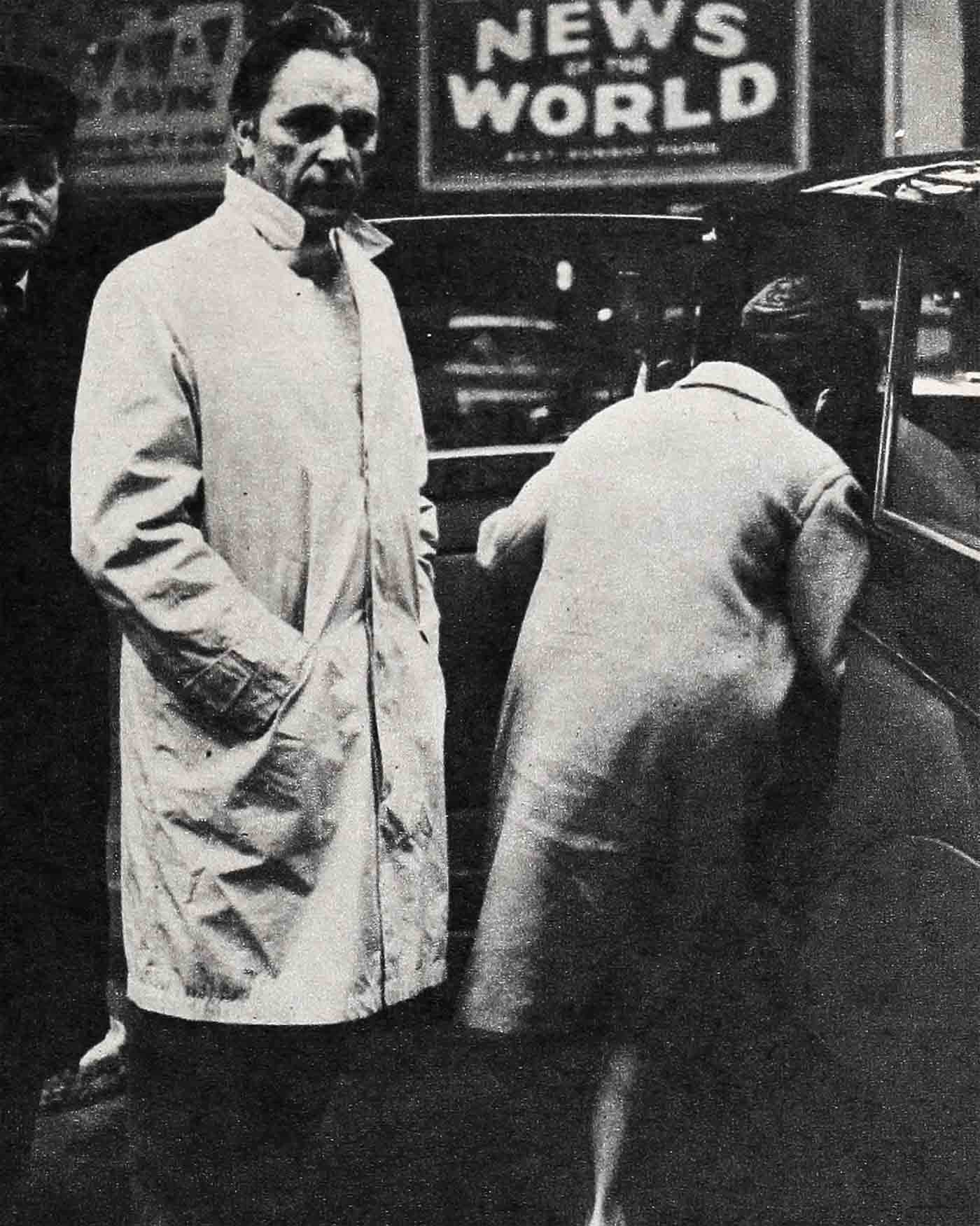
Playing the hellion
Long ago, when Elizabeth was still a teenager and used to talk about her future in the movies, her eyes would flash purple sparks. “What I’d really like to play,” she would gasp excitedly, “is a monster—a hellion.” Overhearing her one day, a powerful M-G-M executive told an associate, “This child has the temperament as well as the beauty to become a great star. And when she begins to show it, oh, brother!”
Still another man who was then close to the Taylor family chuckled. “What the boys have done to Liz in not dating her is nothing compared to what she will do to the boys. At first it may be done unwittingly. But after it becomes easier, there seems little doubt that Elizabeth will take full advantage of her devastating charms to play ringmaster to a generation of willing and performing males.”
Prophetic? “It seems so,” the psychiatrist smiled. “On the other hand. Miss Taylor did not, I think, calculatingly set out to make herself into an international femme fatale; she was conditioned to it, almost subconsciously, by the peculiar, hothouse climate in which she was reared. From the time she was small, everyone deferred to her: parents, friends, the moguls at her studio. When she became bored with a new toy or a new dress or a new present—and she bored very easily—she was given a dozen others. Significantly, she loved wearing her schoolchums’ clothes, while her own dresses hung new and unworn in her closets. Later, let’s say, she yearned to ‘wear’ other women’s lovers or husbands.
“Children showered with gifts, you know, lose all sense of values; they assume that if a bike is damaged or a doll broken, new dolls and bikes will instantly and magically take their place. As adults, then, they simply cannot understand why, if one love shatters, they cannot grab two others. But one thing such bedeviled people never learn is that ‘those who would have more and more, in the end can never have enough.’ ”
Certainly Elizabeth never seemed to learn. Not this bitter lesson, anyway. What she did discover was that once she really got going in the amorous sweepstakes, she could progress from chipmunks to men like a 1,200 mph jet storming the sound barrier. One day she was concerned only with her pet chipmunk, Nibbles, her dogs and cats and horses; the next, she suddenly was aflame with her real powers.
She was young, but not youthful—tossed into the fight ring’s main event almost before she was really ready. “It was tough going for her,” said a classmate, “because she had a lot more ground to make up than most girls.” Yet not until after she married Mike Todd did Elizabeth seemingly fling all caution to the winds. Todd, of course, was the man “who belonged on a runaway horse; a fellow who would pass out salted peanuts at his own hanging if he owned the beer concession.” Some of Todd’s own imperial flamboyance must have rubbed off on Liz.
“Miss Taylor, I gather, has always acted with spectacular non-conformity,” Dr. X observed. “But beginning with Todd, she turned far more aggressive in her romances. Photographs of her around that time show that even her necklines, already revealing, became defiantly lower and lower.”
Once, when she and Todd had one of their Homeric battles, Liz phoned their mutual good friend. Eddie Fisher, in the middle of the night, and tearfully wheedled him into dashing over to console her. After Todd’s death in that plane crash, it was Eddie who had to be at Elizabeth’s side during the Chicago funeral. And when she wanted Eddie to join her for that eyebrow-raising weekend at Grossinger’s—the one that led inevitably to his breakup with Debbie Reynolds—it was Elizabeth who seemingly couldn’t understand why “there was all that fuss.” “I liked Eddie then,” Liz reputedly said, “but I wasn’t really in love with him.”
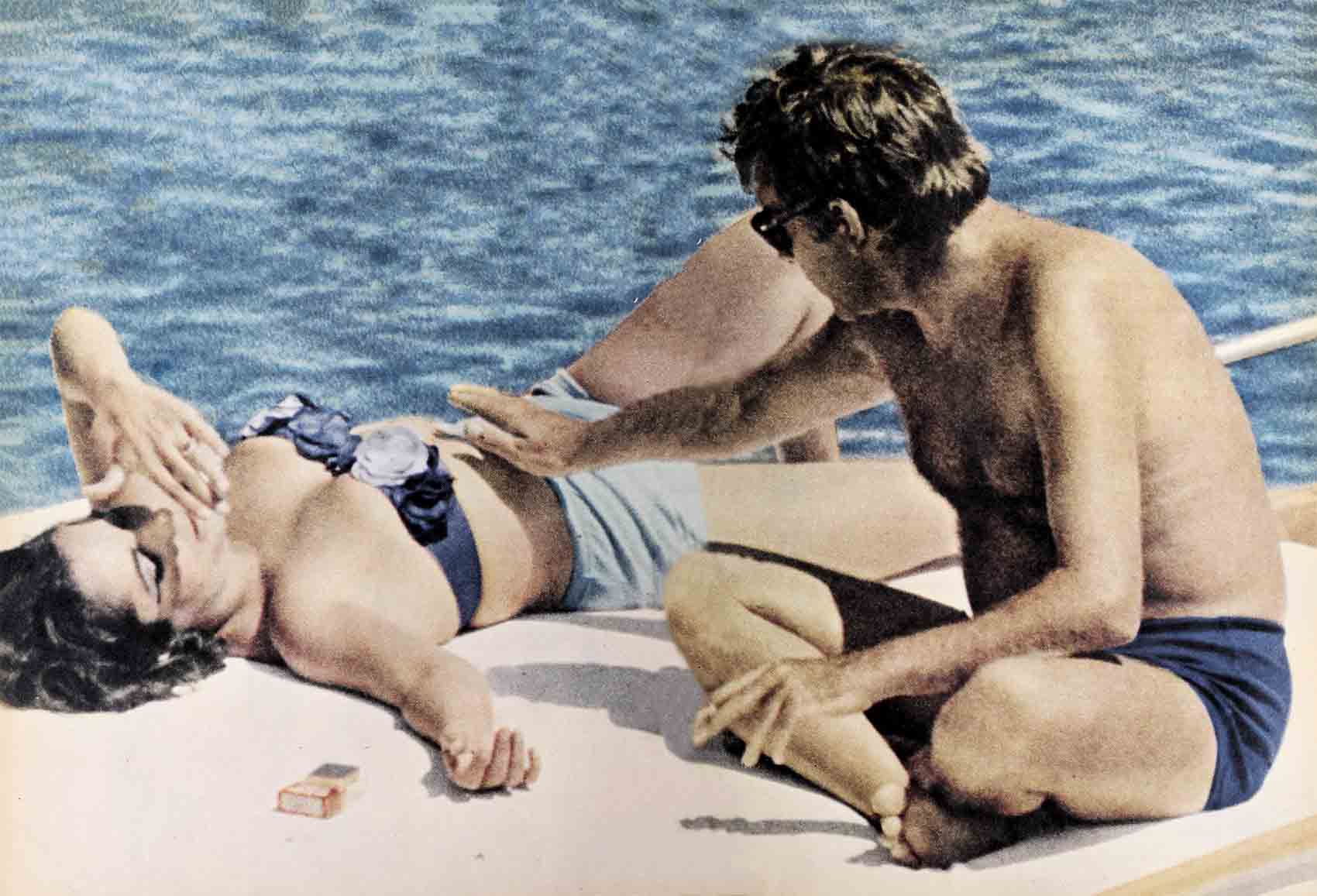
Love is last month’s Cadillac
Was it the latent male-devouring element in Miss Taylor that was then emerging with rampant ferocity? Dr. X did not think so. “I know that Miss Taylor was pictured as ‘a heartless woman, selfish and cruel to the point of depravity.’ She was called ‘ruthless in her disregard for the feelings of those who stood in her way oblivious to her children and indifferent to the wreckage she has left behind her.’ But this, I believe, was not altogether true. Miss Taylor is loyal—when she has time. She would not knowingly hurt anybody—if she thought about it. But her own imperious needs come first, always. This is what she was taught, and this is how she acted. An incorrigible romantic, any old love to her was like a week-old toy, or yesterday’s dress or even last month’s Cadillac that must be discarded. Why not, when there had always been new clothes, new diamonds, new Cadillacs or even Rolls-Royces in pink-ribboned packages just around the corner?”
From the time man was created, there have always been human beings with blind spots of one kind or another. The housebreaker who steals can see no wrong in what he does; the sin is in being caught. The drivingly-ambitious businessman who knifes friends on his way up feels himself justified; he had to battle his way up the career ladder somehow, didn’t he? And Liz—what of her? Wasn’t even the world’s most lavishly beautiful movie star entitled to a few shreds of happiness?
“Mike’s dead, and I’m alive,” Liz cried once. And fourth husband, loyal, devoted, tailwagging Eddie Fisher who used to retire dutifully at nine o’clock in Rome because “that’s what Elizabeth did when she was working”—what of him? “Well,” murmured Liz, after the lusty, earthy Richard Burton had become her lover, “I do feel sorry for Eddie, really.”
True, Welsh Mr. Burton, always finding fresh excitement in making love to his leading ladies on-stage or off, in new “flirtations,” has been known to say, “Never trust a Welshman; they gave the word ‘welsh’ to the world.” In his own way. Burton, too, has always lived his life seeking “more, more, MORE,” just as Elizabeth has. No one could ever push him from the limelight; he had to be the star. “Acting,” he once quipped, “becomes tedious only when some other performer has the center of the stage.” Or loving, for that matter—even an Elizabeth Taylor.
Perhaps the fascinating Burton was the “new toy” Liz sought so hungrily, after the old and quickly-tattered love had been flung into a corner. There are, of course, some who hold that in Richard Burton, Liz Taylor has at last met her match. No other male love fortress had to be stormed so repeatedly or so long. But Elizabeth has always been the avid huntress in each of her romances—always believed that this new man is at last “the man I can really love and cherish.”
Not long ago, in Paris, Elizabeth and Burton were lunching with a visitor. The lunch over. Liz rose to leave. She picked up her ermine-lined raincoat and gave Richard an affectionate kiss on the forehead. “Imagine loving a Welsh coal miner!” she sighed ecstatically.
“Liz,” a friend remarked, “has always conned herself into believing that she is desperately, achingly in love. She has always been the pursuer in all of her affairs: from Nicky Hilton, to director Stanley Donen, to Monty Clift, Rock Hudson, Michael Wilding, Todd, Fisher and now Dick Burton. Does Liz wait for these men—and others—to make the initial approach? The record belies it. Somehow, Liz creates the gossamer fancy, then inflates it into ‘a grand passion’ by herself. I could be wrong, but I see her as a dedicated cated self-deceiver. This may be the chief reason why she has never found lasting happiness.
“Then again, Liz always wails that she is the one who is horribly hurt. But Liz, almost invariably, puts the hex on all her men. She is the huntress and always has been. This is her nature—the genes she can’t escape. Quite possibly it isn’t altogether her fault, no more than the fact that she has raven hair and purple eyes. But her fault or not, her life from the beginning has followed one pre-determined and inevitable pattern. Hers is a bold, eternal, love chase that can never end.”
“Let’s face it, she’s dull”
Now, four times married and mother of four children (one adopted and three of her own), Elizabeth may still be battling that vast and terrible emptiness she felt when she stood around at parties, unwanted and alone, “with egg on my face.” “Elizabeth is an awfully nice girl,” a young actor who dated her once said. “She doesn’t put on airs and she isn’t stuck up. She’s regular. But, let’s face it, she’s dull. She’s just a sweet girl who happens to be more beautiful than anybody else.”
Dull? Elizabeth the Queen? Well, she’d show ’em. If “showing the world” meant “flouting conventions, jeopardizing her career, flinging herself headlong into folly” or being damned for “erotic vagrancy” . . . well, again, what was the point of being beautiful if it was only for one man?
Said the late Jimmy Dean, when he was starring with Elizabeth in “Giant,” “When Taylor makes up her mind, she’s full of indecisions.” Dean, it was rumored, “despised Elizabeth, and had nothing but contempt for her.” Maybe he did; it was a long time ago. Perhaps Dean, too, found Elizabeth “dull.” But Liz. her second husband Mike Wilding once sighed, “needs only to snap her fingers, and she can have any man in the world.”
Almost.
“And yet,” said Dr. X, our psychiatrist, “the toys—or the men—Miss Taylor doesn’t care for or no longer wants, she wads up in her hand like a piece of waste paper and simply tosses away. Alexander the Great wept because there were no more worlds for him to conquer. Miss Taylor doesn’t weep — not for long. As you pointed out,” Dr. X went on. turning to this reporter, “ ‘All I want is MORE,’ Miss Taylor seems to say, ‘and I am going to find it.’ She has demonstrated that she can have almost any man in the world, even the staunchly-married Richard Burton. Almost.
“But while that four-letter word still seems to rule Miss Taylor’s life, people can become as sick with a surfeit of ‘too much’ as inescapably as those who starve on nothing. And ‘more,’ always ‘more,’ can in time lead even an Elizabeth Taylor, beautiful and desirable as she is, to disenchantment and disaster.
“For merely being ravenous can never be enough—not in a love chase that never knows the ending. The cynical observation is true in this case; that there are two great tragedies in life—one is not to get your heart’s desire; the other is to get it.”
THE END
—BY JEFF CRONIN
Liz appears with Burton currently in 20th’s “Cleopatra,” and M-G-M’s “The V.I.Ps.
It is a quote. PHOTOPLAY MAGAZINE OCTOBER 1963


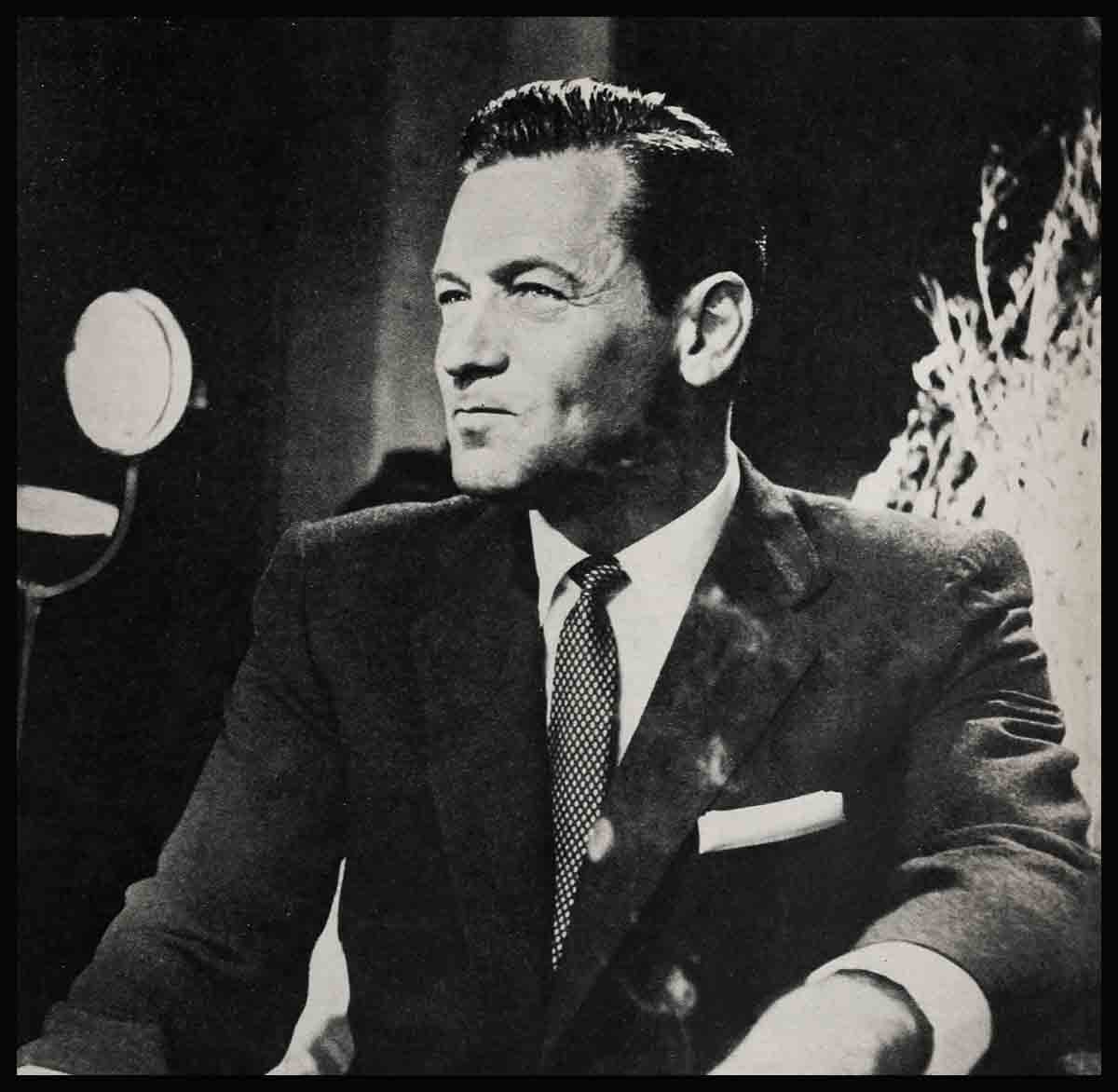

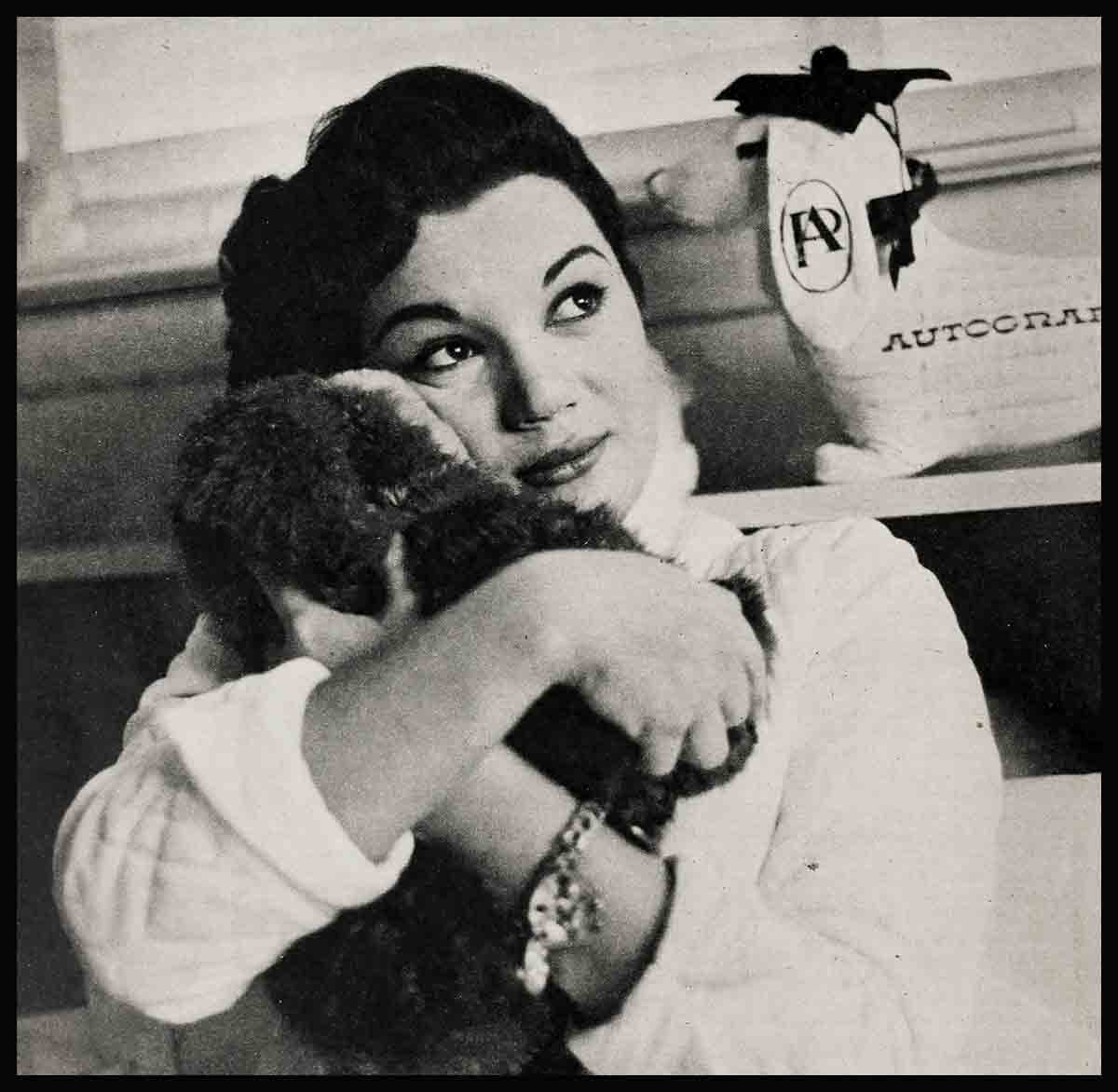
zoritoler imol
3 Ağustos 2023What i do not understood is in fact how you’re no longer actually much more neatly-favored than you might be now. You’re so intelligent. You recognize thus significantly relating to this subject, produced me for my part imagine it from numerous various angles. Its like men and women don’t seem to be fascinated unless it’s something to accomplish with Woman gaga! Your own stuffs nice. All the time deal with it up!